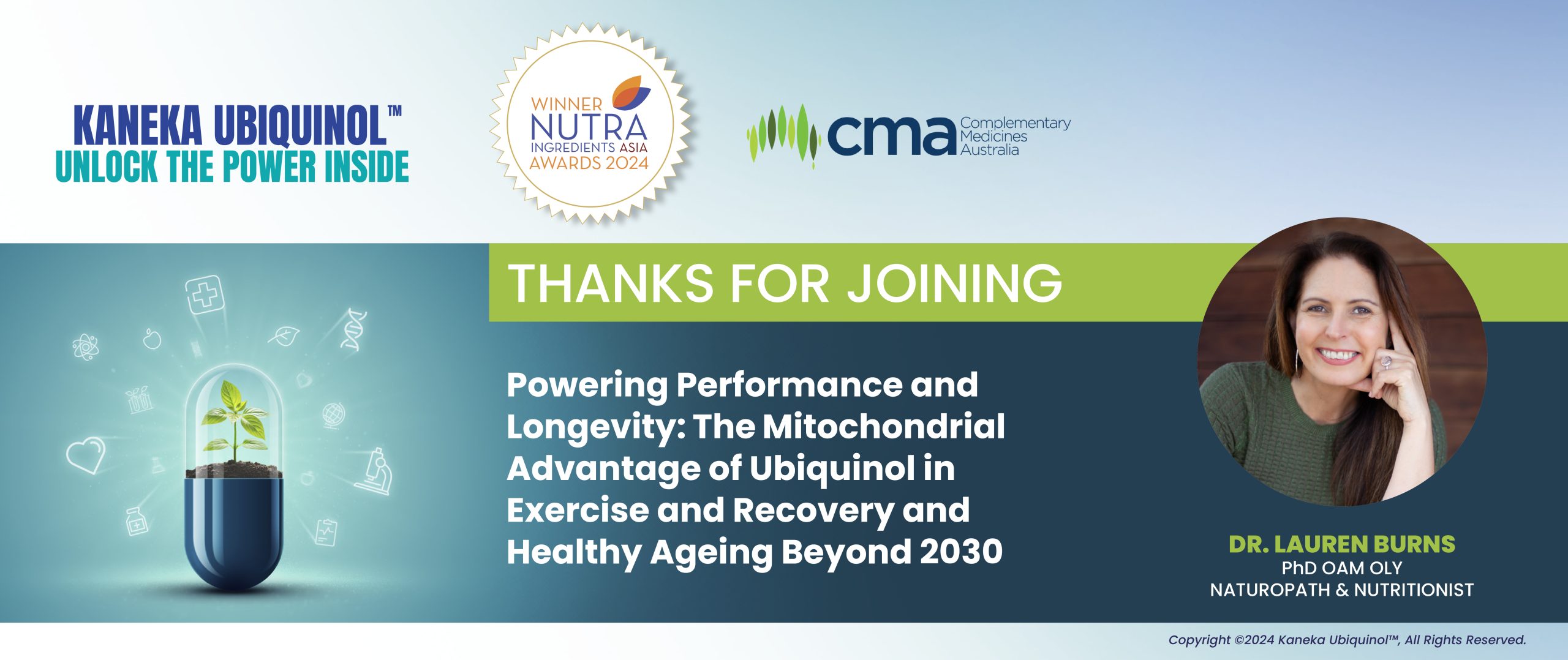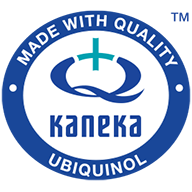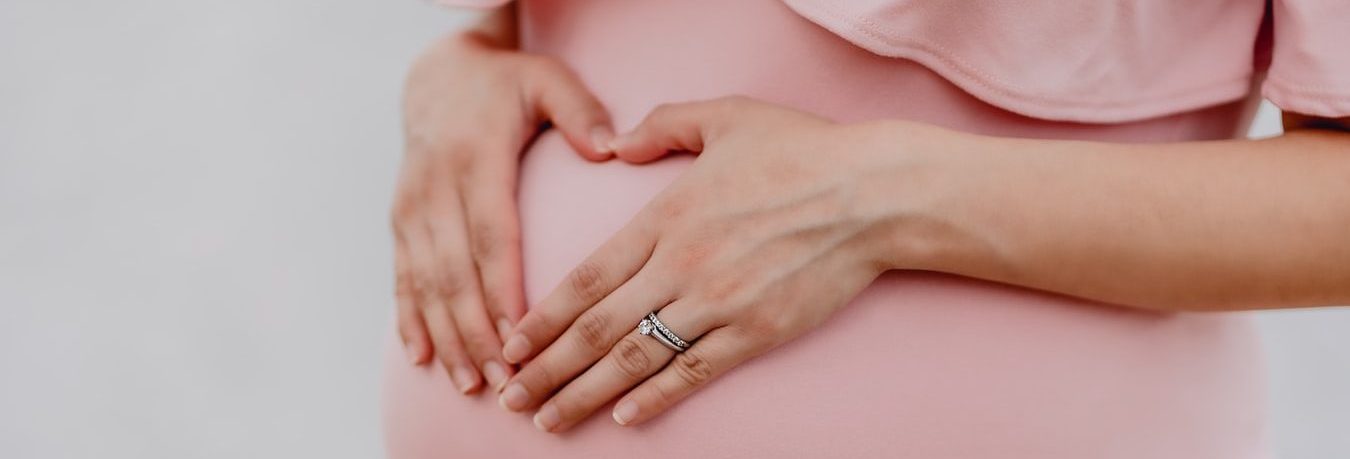
What Every Woman Should Know About Fertility
Jun 2021Recent Article
Infertility affects many women, particularly over the age of 35. Research indicates that mitochondrial energy may have an influence on female fertility.[1] Women who are struggling with fertility issues may be able to support mitochondrial health by considering nutrients which help support mitochondrial energy through ATP production.
How May Ubiquinol Help?
Ubiquinol is the active form of Coenzyme-Q10 (CoQ10). It is a fat-soluble antioxidant found naturally in the body that is important for supporting heart health, [2] cellular energy production, [3] relieving oxidative stress, [4] supporting fertility[5] and supporting overall health and wellbeing.
Ubiquinol supports cellular energy production by assisting the synthesis of ATP in the mitochondria. Optimal levels of Ubiquinol support optimal mitochondrial health.[6]
As part of the natural ageing process, our body’s natural Ubiquinol production levels begin to decrease after age 30.[7] Lifestyle factors such as toxins, poor diet, lack of sleep, and stress which may cause inflammatory reactions may cause Ubiquinol levels to naturally decrease. Ubiquinol can be found in food, however to replenish the body’s natural Ubiquinol levels through food alone may lead to excessive consumption of certain foods; for example consuming 60 avocadoes, 50 cups of spinach or 20 steaks in one day.
To help support the replenishment of your body’s natural Ubiquinol levels, you may wish to speak to a healthcare practitioner to find out if a supplement may be right for you.
The Mitochondria and Fertility
One of the key factors in egg quality is the health of the mitochondria.[8] Mitochondria are essential for supporting cellular energy production as they assist in the synthesis of Adenosine triphosphate (ATP). Healthy mitochondria support cells to grow and multiply normally.[9]
Mitochondria are transferred to the embryo by the mother. Sperm only bring enough mitochondria to reach the egg for fertilisation. Once an egg is fertilised, the mother’s mitochondria becomes the blueprint for the baby’s mitochondria.[10]
How Does Age Affect Fertility?
Egg quality and quantity naturally decline in women as they age.[11] Unlike men who produce sperm on a daily basis, women are born with all of their eggs. A woman who is 40 years of age has eggs that are 40 years old.
Seek advice from a healthcare practitioner to determine if supplementation is right for you. Always read the label.
[1] Cecchino, G., Seli, E., Alves da Motta, E. and García-Velasco, J., 2018. The role of mitochondrial activity in female fertility and assisted reproductive technologies: overview and current insights. Reproductive BioMedicine Online, 36(6), pp.686-697.
[2] Bates, A., Shen, Q., Hiebert, J., Thimmesch, A. and Pierce, J., 2014. Myocardial energetics and ubiquinol in diastolic heart failure. Nursing & Health Sciences, 16(4), pp.428-433.
[3] Alf, D., Schmidt, M. and Siebrecht, S., 2013. Ubiquinol supplementation enhances peak power production in trained athletes: a double-blind, placebo controlled study. Journal of the International Society of Sports Nutrition, 10(1), p.24.
[4] Sarmiento, A., Diaz-Castro, J., Pulido-Moran, M., Moreno-Fernandez, J., Kajarabille, N., Chirosa, I., Guisado, I., Javier Chirosa, L., Guisado, R. and Ochoa, J., 2016. Short-term ubiquinol supplementation reduces oxidative stress associated with strenuous exercise in healthy adults: A randomized trial. BioFactors, 42(6), pp.612-622.
[5] Safarinejad, M., Safarinejad, S., Shafiei, N. and Safarinejad, S., 2012. Effects of the Reduced Form of Coenzyme Q 10 (Ubiquinol) on Semen Parameters in Men with Idiopathic Infertility: a Double-Blind, Placebo Controlled, Randomized Study. Journal of Urology, 188(2), pp.526-531.
[6] Neergheen, V., Chalasani, A., Wainwright, L., Yubero, D., Montero, R., Artuch, R. and Hargreaves, I., 2017. Coenzyme Q10 in the Treatment of Mitochondrial Disease. Journal of Inborn Errors of Metabolism and Screening, 5, p.232640981770777.
[7] Hernández-Camacho, J., Bernier, M., López-Lluch, G. and Navas, P., 2018. Coenzyme Q10 Supplementation in Aging and Disease. Frontiers in Physiology, 9.
[8] Xu, Y., Nisenblat, V., Lu, C., Li, R., Qiao, J., Zhen, X. and Wang, S., 2018. Pretreatment with coenzyme Q10 improves ovarian response and embryo quality in low-prognosis young women with decreased ovarian reserve: a randomized controlled trial. Reproductive Biology and Endocrinology, 16(1).
[9] Yetkin-Arik, B., Vogels, I., Nowak-Sliwinska, P., Weiss, A., Houtkooper, R., Van Noorden, C., Klaassen, I. and Schlingemann, R., 2019. The role of glycolysis and mitochondrial respiration in the formation and functioning of endothelial tip cells during angiogenesis. Scientific Reports, 9(1).
[10] Zhou, Q., Li, H., Li, H., Nakagawa, A., Lin, J., Lee, E., Harry, B., Skeen-Gaar, R., Suehiro, Y., William, D., Mitani, S., Yuan, H., Kang, B. and Xue, D., 2016. Mitochondrial endonuclease G mediates breakdown of paternal mitochondria upon fertilization. Science, 353(6297), pp.394-399.[11] George, K. and Kamath, M., 2010. Fertility and age. Journal of Human Reproductive Sciences, 3(3), p.121.
You can share this by:
Keep up-to-date with Ubiquinol News
Ubiquinol Headlines

Retail Pharmacy: Healthy Ageing in the Spotlight
Apr 2025Category: Ageing, Antioxidants, APP, Conference, Conferences, Endurance, Health, Health Industry, healthy ageing, Immunity, In The News, Mitochondrial health, Nutrition, Online, Stress, Ubiquinol, Vitamins, wellnessRead More
Retail Pharmacy: The Impact of Loneliness on Heart Health
Apr 2025Category: cardiovascular health, dr ross walker, Heart, In The News, Mitochondrial health, Online, UbiquinolRead More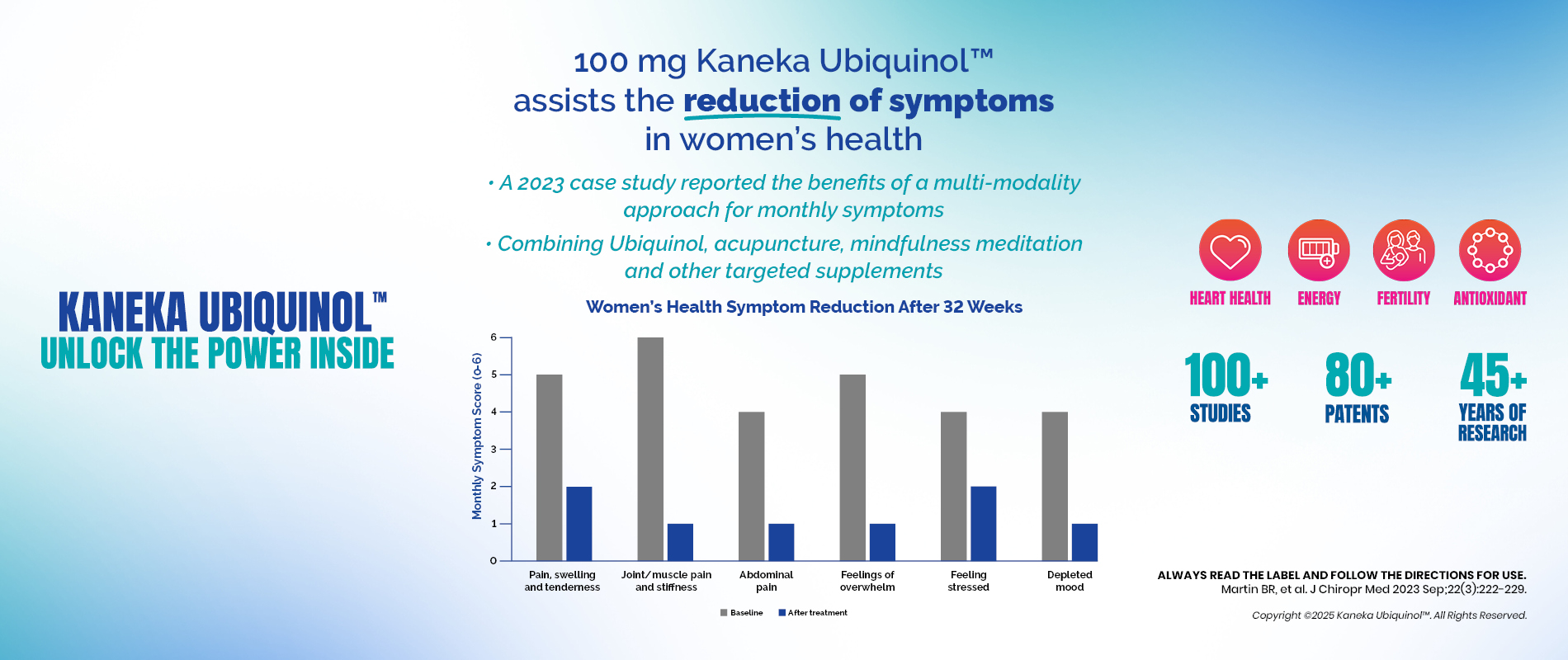
Ubiquinol for Women’s Health
Apr 2025Category: Ageing, Antioxidants, Fertility, Kaneka, Mitochondrial health, Ubiquinol, wellness, Women's HealthRead More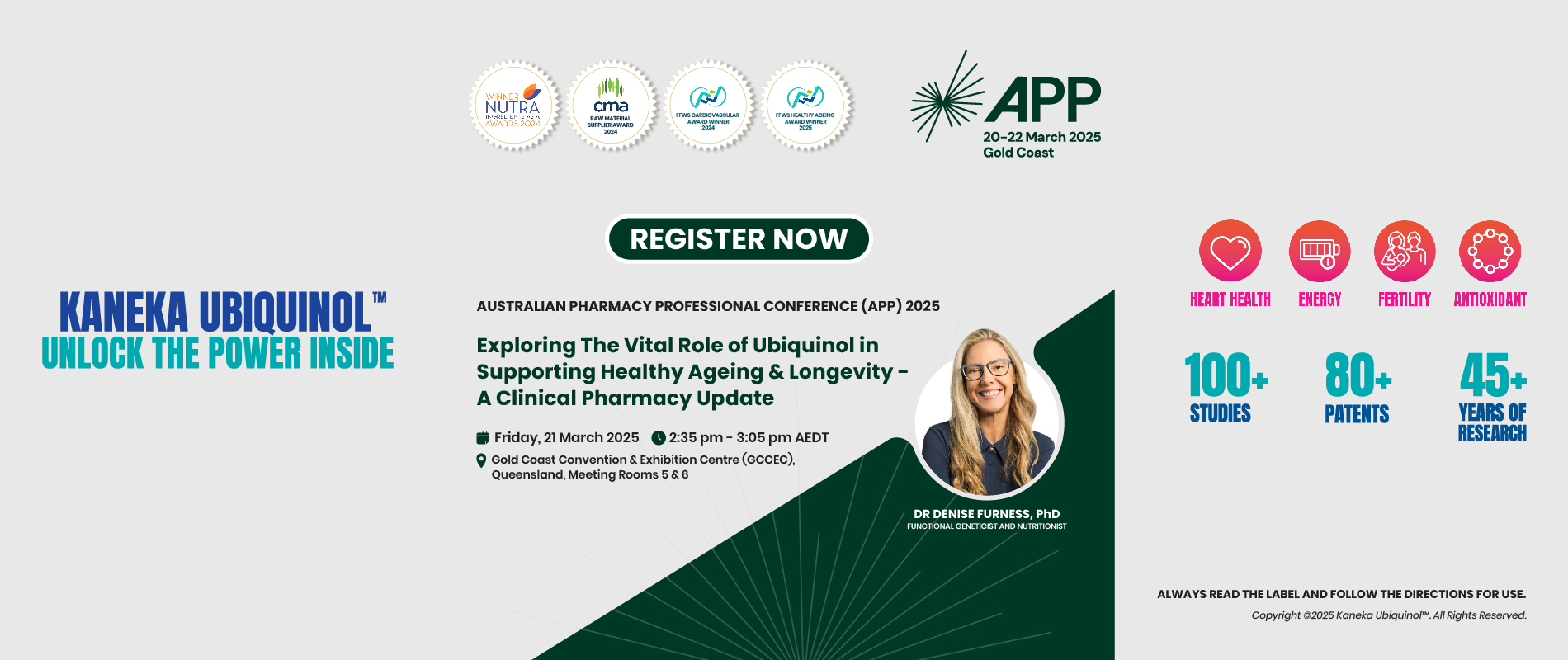
Kaneka Ubiquinol™ at APP 2025: Advancing Healthy Ageing & Longevity
Mar 2025Category: Ageing, Antioxidants, APP, Conference, Conferences, Energy, Fatigue, Health, Health Industry, healthy ageing, Kaneka, Mitochondrial health, Nutrition, UbiquinolRead More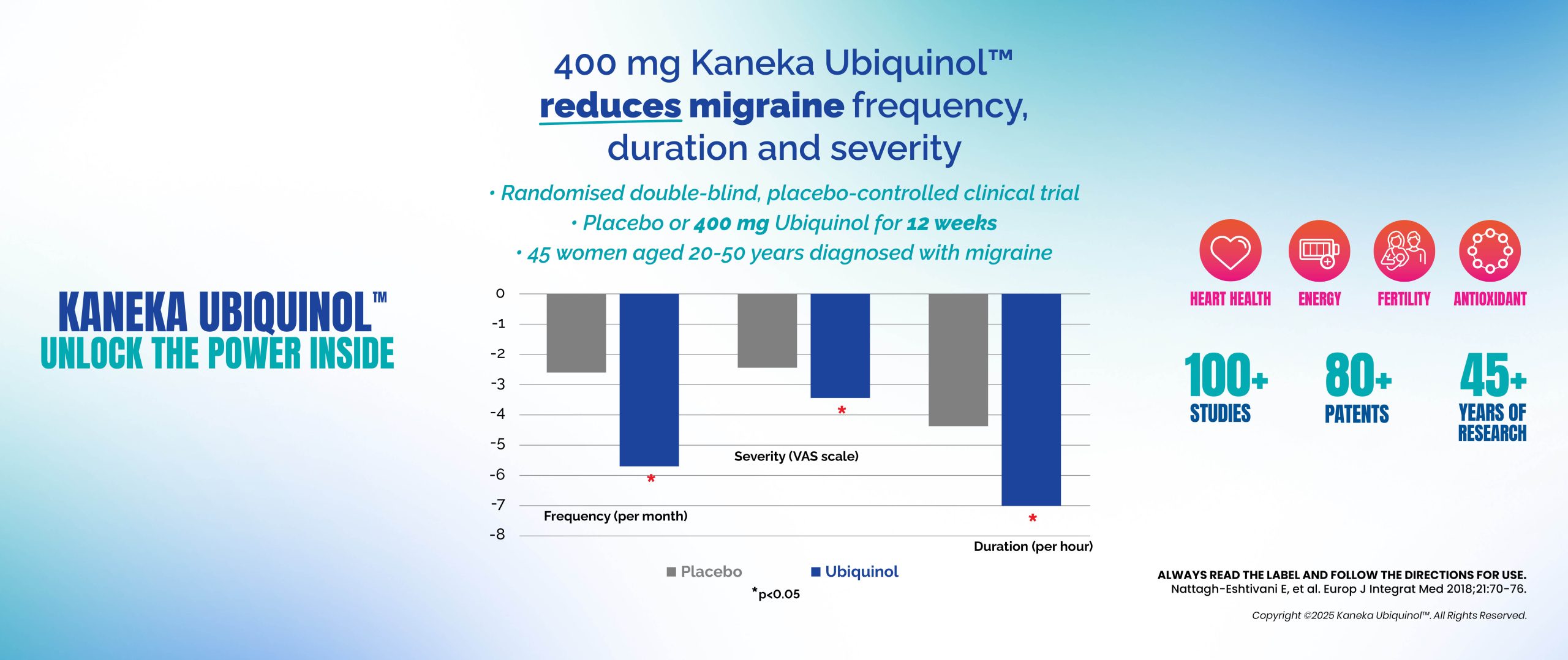
Ubiquinol: Supporting Migraine Relief Through Cellular Energy
Jan 2025Category: Antioxidants, complementary medicine, Energy, Fatigue, Health, Health Industry, healthy ageing, Kaneka, Mitochondrial health, Nutrition, Stress, Ubiquinol, Vitamins, wellnessRead More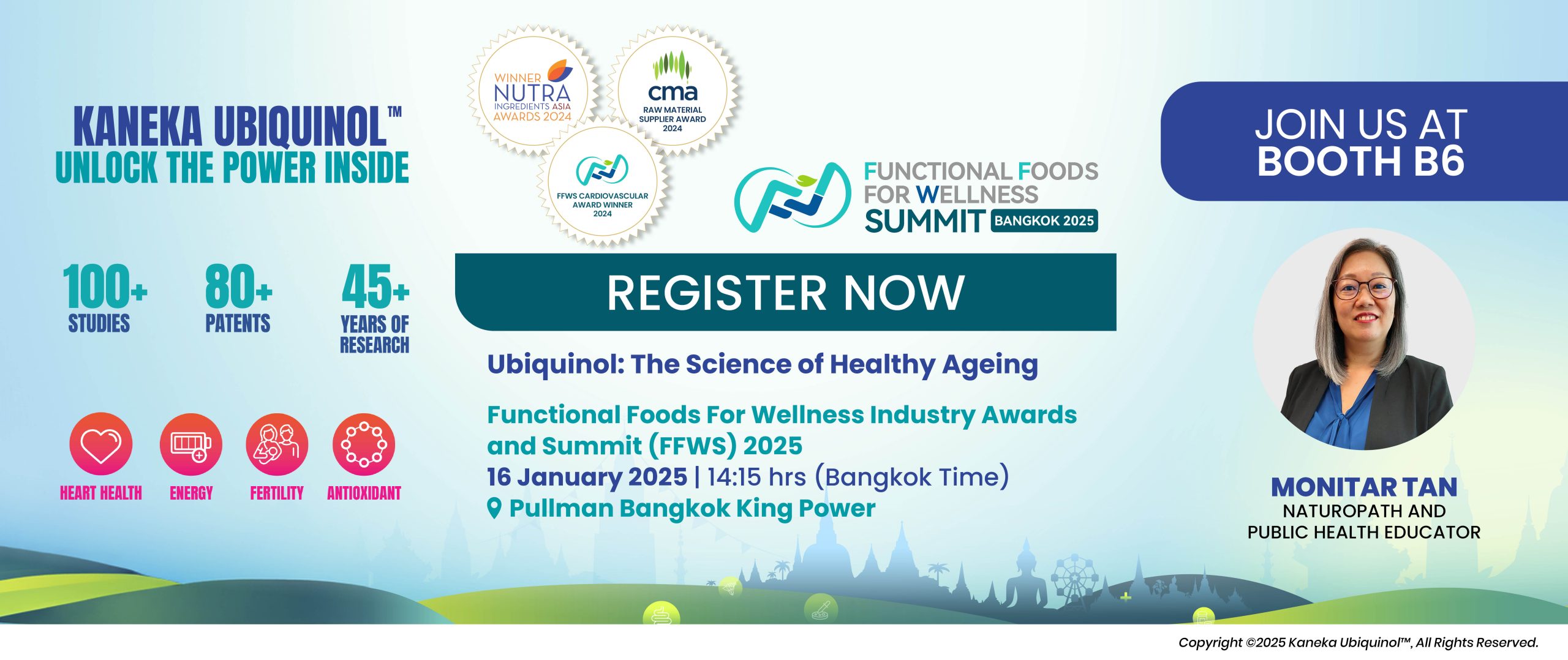
Kaneka Ubiquinol™ at Functional Foods for Wellness Industry Awards and Summit, #FFWS2025
Jan 2025Category: Ageing, Antioxidants, Awards, cardiovascular health, Conference, Conferences, Energy, Fatigue, FFWS2025, Health, Health Industry, healthy ageing, Kaneka, Menopause, Mitochondrial health, Nutrition, Ubiquinol, VitaminsRead More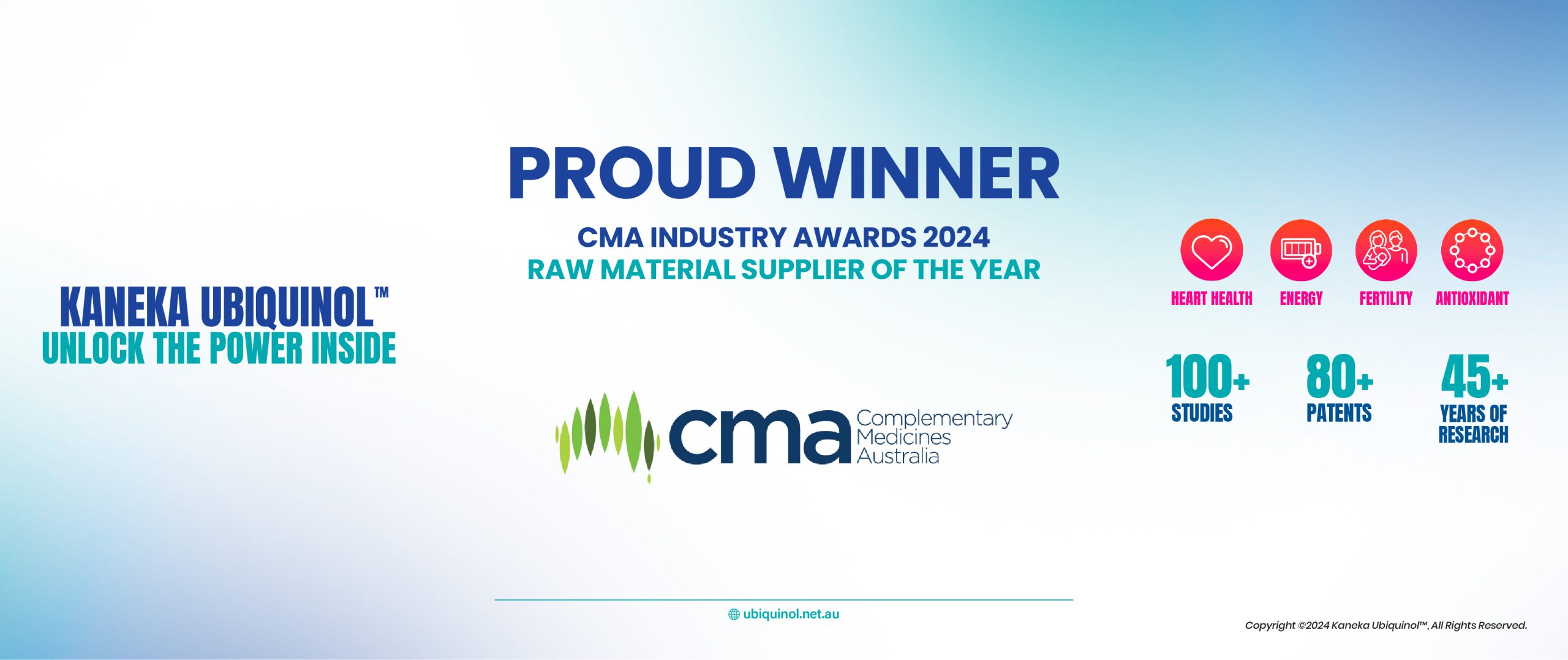
Kaneka Ubiquinol Wins Prestigious Complementary Medicines Raw Material Supplier of the Year Award 2024
Dec 2024Category: Ageing, Awards, cardiovascular health, complementary medicine, Conference, Conferences, Endurance, Energy, Fatigue, Fertility, Fitness, Health, Health Industry, healthy ageing, Heart, Immunity, In The News, Kaneka, Lungs, Memory, Mitochondrial health, Nutrition, Online, Stress, Ubiquinol, Vitamins, wellnessRead More